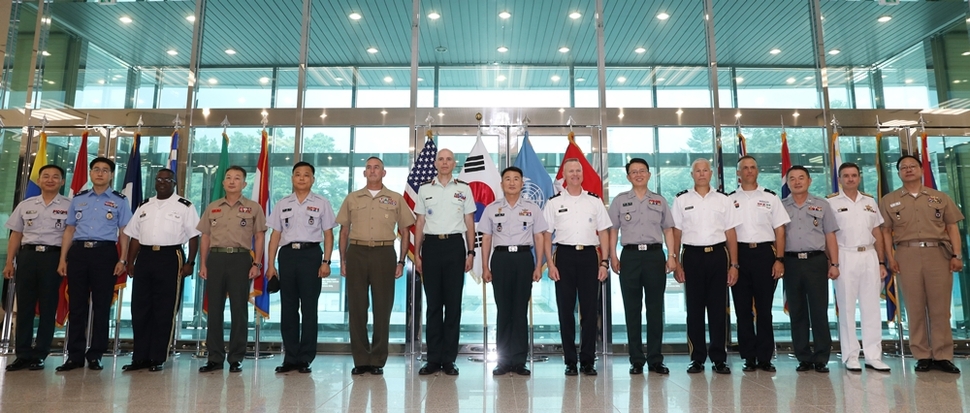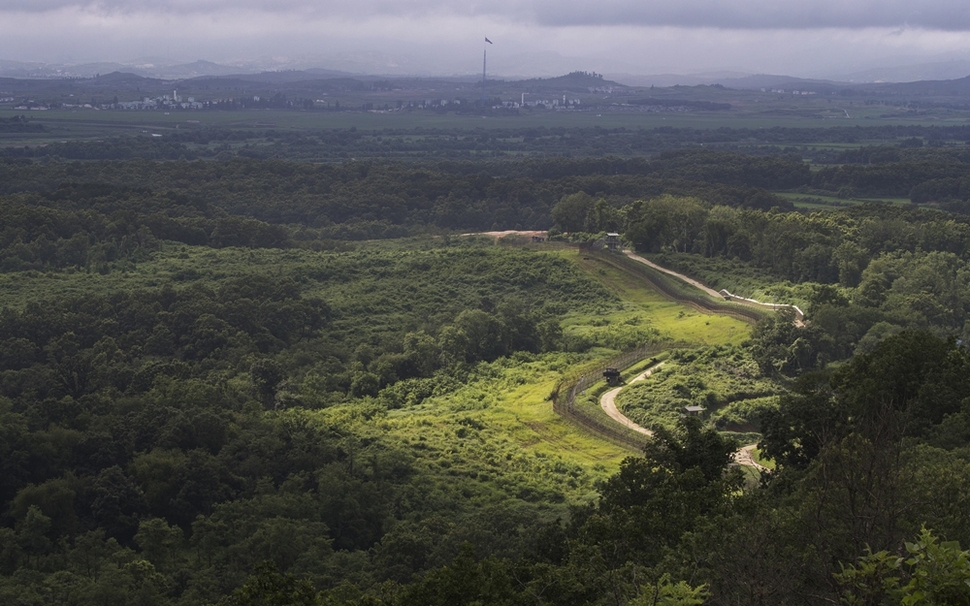 |
|
Gen. Wayne Eyre, deputy commander of the UNC (seventh from the left) and Shin Sang-bum, senior South Korean member of the UNC, during the 65th anniversary of the Korean Armistice Agreement at the House of Peace in Panmunjom on July 27.
|
UNC is set to expire once the Korean War is officially over
Witnessing the UN Command’s recent decision not to allow South and North Korea to pass through the Demilitarized Zone (DMZ) for a joint inspection of the Gyeongui (Seoul-Sinuiju) railway line left me with a greater sense than ever than the reason the US keeps balking at North Korea’s demands for a declaration ending the Korean War has to do with the command itself. As is commonly known, US military interventions on the Korean Peninsula occur at three levels with the UN Command (UNC), the ROK-US Combined Forces Command (CFC), and US Forces Korea (USFK). Of the three, the standing of the CFC and USFK is based on military alliance agreements between South Korea and the US and has no bearing on an end-of-war declaration. The UNC’s status, however, is based on an UN Security Council resolution. Passed two days after the Korean War broke out on June 25, 1950, that resolution states the UNC’s duties as “repel[ling] the armed attack [on South Korea] and [. . .] restor[ing] international peace and security in the area.” In other words, the UNC was set to expire once the war with North Korea was over. Concerns that an end-of-war declaration could jeopardize the UNC’s standing are not unfounded. At the same time, the UNC would be a difficult organization for the US military to let go of. It is to the UNC that operational control authority for the South Korean armed forces was granted in the South Korea-US Agreed Minute signed in Nov. 1954. The US military’s operational control over South Korea’s armed forces was institutionalized with the USFK commander also heading the UNC. The UNC is also the legal agent for seven rear bases held by the US military in Japan for free use in the event of an emergency on the Korean Peninsula. Any endangering of the UNC’s status could create legal problems with the use of these UNC rear bases in Japan. After a debated erupted in the 1970s with a passage of a UN General Assembly motion recommending the UNC’s dissolution, operational control over South Korean forces was handed over to the CFC (established in Nov. 1978), and the UNC became purely an administrative body for the armistice agreement. Within the US military, however, there have been calls for the past decade or so to bring back the UNC as an organization pursuing US military interests following the OPCON transfer. During the Roh Moo-hyun administration in Jan. 2007, then-USFK Commander Gen. Burwell Bell called for a stronger UN Command in a press conference just before the two sides’ agreement on the OPCON handover.
 |
|
A view of the North Korean propaganda village Gijongdong past the barb wire of the DMZ’s southern limit line (SLL). (Kim Jin-su, staff photographer)
|







